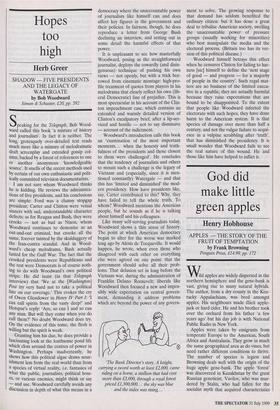Hopes too high
Herb Greer
SHADOW — FIVE PRESIDENTS AND THE LEGACY OF WATERGATE by Bob Woodward Simon & Schuster, £20, pp. 592 Speaking for the Telegraph, Bob Wood- ward called this book 'a mixture of history and journalism'. In fact it is neither. The long, grotesquely over-detailed text reads much more like a mixture of melodramatic draft screenplay and extended gossip col- umn, backed by a forest of references to one or another anonymous 'knowledgeable source'. It smells of the recent methods used by certain of our own enthusiastic and polit- ically committed television documentarists.
I am not sure whom Woodward thinks he is kidding. He reviews the administra- tions of five presidents, and his conclusions are simple: Ford was a clumsy stopgap president; Carter and Clinton were venial sinners with sad, understandable character defects; as for Reagan and Bush, they were crooks — not as bad as Nixon, whom Woodward continues to demonise as an out-and-out criminal, but crooks all the same, forever tainted by the skulduggery of the Iran-contra scandal. And in Wood- ward's cheap melodrama, Bush actually lusted for the Gulf War. The fact that the crooked presidents were Republicans and the rest were Democrats is of course noth- ing to do with Woodward's own political stripe. He did insist (in that Telegraph interview) that 'We at the [Washington] Post try very hard not to take a political line on our coverage.' This evokes the cry of Owen Glendower in Henry IV Part I: 'I can call spirits from the vasty deep!' and Hotspur's reply: 'Aye, so can I and so can any man. But will they come when you do call them?' No doubt Woodward does try. On the evidence of this tome, the flesh is willing but the spirit is weak.
Granting him his due, he does provide a fascinating look at the loathsome pond life which clots around the centres of power in Washington. Perhaps inadvertently, he shows how this political algae draws nour- ishment less from the real world than from a species of virtual reality, i.e. fantasies of what the public, journalists, political boss- es, or various enemies, might think or say — and use. Woodward carefully avoids any discussion in depth of what this means in a democracy where the unaccountable power of journalists like himself can and does affect key figures in the government and their policies. In fairness, though, he does reproduce a letter from George Bush declining an interview, and setting out in some detail the harmful effects of that power.
It is unpleasant to see how masterfully Woodward, posing as the straightforward journalist, deploys the cowardly (and disin- genuous) technique of pushing his own views — not openly, but with a trick bor- rowed from cinematic montage: high-pro- file treatment of quotes from players in his melodrama that clearly reflect his own (lib- eral Democratic) line of prejudice. This is most spectacular in his account of the Clin- ton impeachment case, which contains an extended and warmly detailed version of Clinton's exculpatory brief, after a lip-ser- viced and hostile — not to say dismissive — account of the indictment.
Woodward's introduction calls this book an 'examination of the most important moments... when the honesty and truth- fulness of the presidents and those closest to them were challenged'. He concludes that the tendency of journalists and others to mount such a challenge is the legacy of Vietnam and (especially, since it is men- tioned constantly) Watergate — and that this has 'limited and diminished' the mod- ern presidency. How have presidents like, say, Carter contributed to this? Why, they have failed to tell the whole truth. To whom? Woodward mentions the American people, but he sounds as if he is talking about himself and his colleagues.
Like many self-serving journalists today, Woodward shows a thin sense of history. The point at which American democracy began to alter for the worse was marked long ago by Alexis de Tocqueville. It would happen, he wrote, when even those who disagreed with each other on everything else were agreed on one point: that the government should solve all their prob- lems. That delusion set in long before the Vietnam war, during the administration of Franklin Delano Roosevelt; liberals like Woodward then focused a new and impos- sibly wide expectation on central govern- ment, demanding it address problems which are beyond the power of any govern- `The Bank Director's story. A knight, carrying a sword worth at least £2,000, came riding on a horse, a stallion that had cost more than £3,000, through a royal forest priced £1,300,000. . the sky was blue and the index was rising... ' ment to solve. The growing response to that demand has seldom benefited the ordinary citizen: but it has done a great deal to tribalise American society, swelling the unaccountable power of pressure groups (usually working for minorities) who best manipulate the media and the electoral process. (Britain too has its ver- sion of this political disease.) Woodward himself betrays this effect when he censures Clinton for failing to har- ness [sic] himself to define the 'next stage of good — and progress — for a majority of people in the country'. Such regal mat- ters are no business of the limited execu- tive in a republic; they are actually harmful because they raise expectations that are bound to be disappointed. To the extent that people like Woodward infected the electorate with such hopes, they have done harm to the American system. It is that species of damage over more than half a century, and not the vulgar failure to acqui- esce in a vulpine scrabbling after 'truth', that has diminished the presidency. It is small wonder that Woodward fails to see the real nature of this wound. He and those like him have helped to inflict it.


























































 Previous page
Previous page